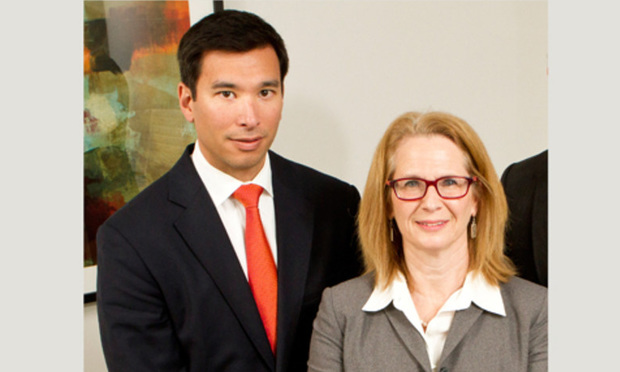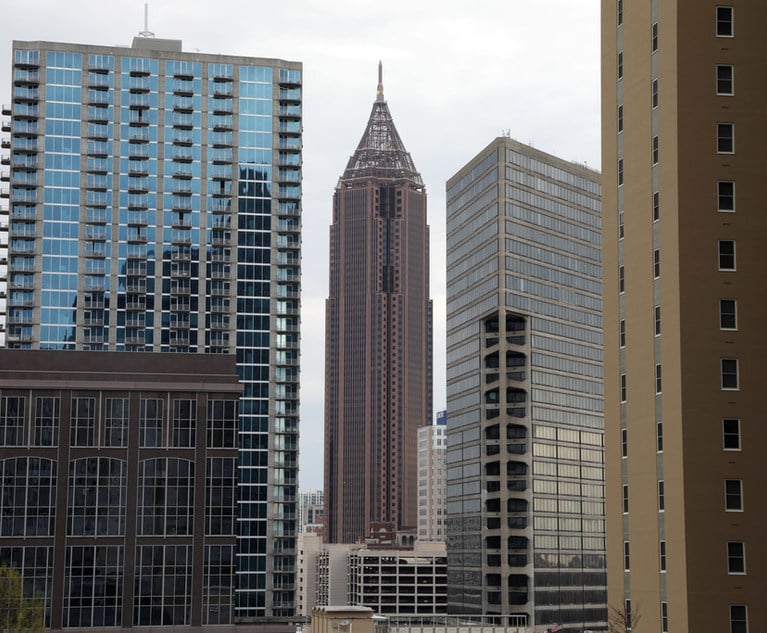'Not Very Sexy' Title Dispute Ends With $4.5M Check
"I'm more happy about the results for the client," said Bryan Knight of Knight Palmer, who along with Sherri Buda represented RM Kids. "They actually stood up to the insurance company where many people would have bowed out years ago."
November 08, 2019 at 11:58 AM
4 minute read
 Bryan Knight (left) and Sherri Buda, Knight Johnson LLC, Atlanta. (Photos: John Disney/ALM)
Bryan Knight (left) and Sherri Buda, Knight Johnson LLC, Atlanta. (Photos: John Disney/ALM)
A nine-year litigation battle over a title insurance claim that the lead lawyer described as "not very sexy" has finally concluded in a way that made him happy nonetheless—with a $4.5 million payment.
"I'm more happy about the results for the client," said Bryan Knight of Knight Palmer, who along with Sherri Buda represented a real estate investment group called RM Kids. "They actually stood up to the insurance company where many people would have bowed out years ago."
At the heart of the case was an oil spill from the 1990s that contaminated the land and groundwater in the area off Ga. 316 near Sugarloaf Parkway in Gwinnett County—which in that era had become known as the fastest growing suburb in the country.
In 2007, a deal was made by a developer to buy 151 acres there for $11.4 million, with plans for a residential subdivision. Peachtree Bank provided the loan, then later sold the loan to Knight's client.
"After they bought the note, it became apparent there was a title defect," Knight said. "The defect became known in the years of litigation that followed as Exhibit C, which was a document disclosing the oil spill. It required 'notice to all subsequent landowners' of petroleum contamination from an underground pipeline affecting groundwater and surface water. The damage has been mediated and monitored since and will require continued monitoring, according to the document. Restrictions include but are not limited to 'drinking, bathing, cleaning, irrigation or installation of wells.'"
The original lender's real estate closing attorney left Exhibit C out of the paperwork. He later blamed the omission on his paralegal. But they were not the defendants. The defendant was Old Republic National Title Insurance Co., which declined to cover the defect.
In 2010, RM Kids sued Old Republic over the omission, alleging it amounted to a title defect.
In 2015, RM Kids won a $7.1 million verdict based on the difference between the land value with and without contamination. Old Republic appealed. The Georgia Court of Appeals reversed on an issue of first impression, ruling that the value of the property had to be set as of the date of foreclosure, which was at a post-recession low in 2012, not the date of the sale, which was in 2007, before the real estate bubble burst.
In 2018, the case was tried again, this time with a $4.2 million verdict. Old Republic appealed again, saying the judge should have granted the defense a directed verdict.
In October, the Court of Appeals issued another opinion, this time affirming the verdict.
"We conclude that the easements and restrictions constituted defects in title that are covered by the policy, and there was sufficient evidence to establish damages," Judge Todd Markle wrote for a panel that included Presiding Judge Sara Doyle and Judge Chris Coomer. "The trial court properly denied the motion for directed verdict."
Gwinnett County Superior Court Judge Tom Davis, now retired, heard the case the first time. Magistrate Judge Robert Walker presided over the second trial.
Last week, Knight said, Old Republic paid RM Kids the full amount of the verdict plus $300,000 in post-judgment interest, for a total of $4.5 million.
Old Republic was represented by William Brown of Heyman & Sizemore along with Ed Wasmuch Jr. and Ed Burch Jr., both of Smith, Gambrell & Russell. They did not have an immediate comment.
"At the end of the day, Old Republic should be very happy with their counsel," Knight said. "They were able to reduce the amount they owed by $3 million and hold the money for nine years. They probably made more from investing it than they paid."
Knight had an extra reason to celebrate—thanks to a gamble he made along the way.
"I typically do most of my cases on hourly. I did the first trial hourly. But it took my clients five years to get a trial," Knight said. Then the verdict was overturned. RM Kids were tapped.
"They came to me and said, 'Do you want to take the second trial on contingency?'" Knight said.
His answer?
"Yeah, let's do it."
Knight wouldn't disclose the percentage of his contingency agreement. But he did have this to say about the story's conclusion: "I feel pretty good about it."
This content has been archived. It is available through our partners, LexisNexis® and Bloomberg Law.
To view this content, please continue to their sites.
Not a Lexis Subscriber?
Subscribe Now
Not a Bloomberg Law Subscriber?
Subscribe Now
NOT FOR REPRINT
© 2025 ALM Global, LLC, All Rights Reserved. Request academic re-use from www.copyright.com. All other uses, submit a request to [email protected]. For more information visit Asset & Logo Licensing.
You Might Like
View All
Why Georgia's Latest Push to Curb Lawsuits Has Business Groups and Trial Lawyers at Odds
6 minute read
Eversheds Sutherland Moving After 36 Years to Smaller Atlanta Office
4 minute read
Fowler White Burnett Opens Jacksonville Office Focused on Transportation Practice
3 minute read
Trending Stories
- 1New FCC Chair Hires Section 230 Critic as General Counsel
- 2Sylvia Favretto Elevated to Mysten Labs’ General Counsel
- 3Vanessa Roberts Avery Rejoins McCarter & English
- 4Charlie Javice Jury Will Not See Her Texts About Elizabeth Holmes
- 5Unit Owners Sued Board For Failure To Maintain Adequate Fire Insurance: This Week In Scott Mollen’s Realty Law Digest
Who Got The Work
J. Brugh Lower of Gibbons has entered an appearance for industrial equipment supplier Devco Corporation in a pending trademark infringement lawsuit. The suit, accusing the defendant of selling knock-off Graco products, was filed Dec. 18 in New Jersey District Court by Rivkin Radler on behalf of Graco Inc. and Graco Minnesota. The case, assigned to U.S. District Judge Zahid N. Quraishi, is 3:24-cv-11294, Graco Inc. et al v. Devco Corporation.
Who Got The Work
Rebecca Maller-Stein and Kent A. Yalowitz of Arnold & Porter Kaye Scholer have entered their appearances for Hanaco Venture Capital and its executives, Lior Prosor and David Frankel, in a pending securities lawsuit. The action, filed on Dec. 24 in New York Southern District Court by Zell, Aron & Co. on behalf of Goldeneye Advisors, accuses the defendants of negligently and fraudulently managing the plaintiff's $1 million investment. The case, assigned to U.S. District Judge Vernon S. Broderick, is 1:24-cv-09918, Goldeneye Advisors, LLC v. Hanaco Venture Capital, Ltd. et al.
Who Got The Work
Attorneys from A&O Shearman has stepped in as defense counsel for Toronto-Dominion Bank and other defendants in a pending securities class action. The suit, filed Dec. 11 in New York Southern District Court by Bleichmar Fonti & Auld, accuses the defendants of concealing the bank's 'pervasive' deficiencies in regards to its compliance with the Bank Secrecy Act and the quality of its anti-money laundering controls. The case, assigned to U.S. District Judge Arun Subramanian, is 1:24-cv-09445, Gonzalez v. The Toronto-Dominion Bank et al.
Who Got The Work
Crown Castle International, a Pennsylvania company providing shared communications infrastructure, has turned to Luke D. Wolf of Gordon Rees Scully Mansukhani to fend off a pending breach-of-contract lawsuit. The court action, filed Nov. 25 in Michigan Eastern District Court by Hooper Hathaway PC on behalf of The Town Residences LLC, accuses Crown Castle of failing to transfer approximately $30,000 in utility payments from T-Mobile in breach of a roof-top lease and assignment agreement. The case, assigned to U.S. District Judge Susan K. Declercq, is 2:24-cv-13131, The Town Residences LLC v. T-Mobile US, Inc. et al.
Who Got The Work
Wilfred P. Coronato and Daniel M. Schwartz of McCarter & English have stepped in as defense counsel to Electrolux Home Products Inc. in a pending product liability lawsuit. The court action, filed Nov. 26 in New York Eastern District Court by Poulos Lopiccolo PC and Nagel Rice LLP on behalf of David Stern, alleges that the defendant's refrigerators’ drawers and shelving repeatedly break and fall apart within months after purchase. The case, assigned to U.S. District Judge Joan M. Azrack, is 2:24-cv-08204, Stern v. Electrolux Home Products, Inc.
Featured Firms
Law Offices of Gary Martin Hays & Associates, P.C.
(470) 294-1674
Law Offices of Mark E. Salomone
(857) 444-6468
Smith & Hassler
(713) 739-1250






